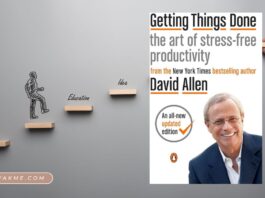Today, we’re going to dive into one of the most impactful books on productivity and focus—“Deep Work” by Cal Newport. In a world filled with distractions, Newport’s book is a must-read for anyone looking to enhance their ability to focus and produce meaningful work. We’re going to explore seven key lessons from “Deep Work” that will help you harness the power of deep, focused work and take your productivity to the next level.
Lesson 1. The Importance of Deep Work
The first lesson from “Deep Work” is understanding the critical importance of deep work itself. Newport defines deep work as the ability to focus without distraction on a cognitively demanding task. In today’s world, where distractions are everywhere, deep work has become a rare skill—yet it’s one of the most valuable. Whether you’re a writer, programmer, or business leader, the ability to work deeply is what will set you apart from the competition.
Newport argues that deep work is the key to producing high-quality results in less time. It’s about going beyond shallow tasks like checking emails and social media, and instead dedicating focused time to tasks that truly matter. By embracing deep work, you can achieve breakthroughs in your work and develop a skill set that’s increasingly rare and valuable in the modern economy.
Lesson 2. Embrace Boredom
The second lesson is to embrace boredom. In our always-connected world, we’ve become accustomed to constant stimulation—whether it’s checking our phones during a lull or scrolling through social media when we’re bored. However, Newport argues that to succeed at deep work, we need to retrain our brains to handle boredom.
Deep work requires sustained focus, and if we’re constantly indulging in distractions, we weaken our ability to concentrate for long periods. Newport suggests that we should practice resisting the urge to reach for our phones or other distractions when we feel bored. By doing so, we build our capacity for deep focus, making it easier to engage in deep work when it matters most.
Lesson 3. Quit Social Media
One of the more controversial lessons from “Deep Work” is Newport’s advice to quit social media. While social media can offer some benefits, Newport argues that for most people, the negatives far outweigh the positives. Social media platforms are designed to be addictive, constantly pulling our attention away from deep work and towards shallow, superficial tasks.
Newport suggests conducting a “social media detox,” where you eliminate or drastically reduce your use of social media for a period of time. This allows you to assess whether these platforms are truly adding value to your life. If you find that you’re not missing out on anything important, it might be worth quitting social media altogether—or at least setting strict limits on your usage. By doing so, you free up more time and mental energy for deep work.
Lesson 4. Structure Your Day for Deep Work
The fourth lesson is to structure your day to maximize deep work. Newport emphasizes the importance of scheduling deep work sessions into your daily routine. Rather than waiting for the right moment to engage in deep work, you should proactively plan when and where you’ll do it. This could mean setting aside the first few hours of your workday for focused, uninterrupted work or dedicating certain days of the week to deep work.
By creating a routine that prioritizes deep work, you make it easier to enter a state of flow, where you’re fully immersed in your work. Newport also suggests setting clear boundaries during these sessions—turn off notifications, close your email, and let others know that you’re not to be disturbed. The more you can protect your deep work time, the more productive and focused you’ll be.
Lesson 5. Work Deeply, Rest Deeply
The fifth lesson from “Deep Work” is the importance of balancing deep work with deep rest. Newport highlights that to sustain high levels of productivity, you need to balance periods of intense focus with adequate rest. This means not only getting enough sleep but also engaging in activities that allow your mind to fully disconnect from work.
Deep rest can take many forms—exercise, spending time in nature, pursuing hobbies, or simply relaxing with loved ones. The key is to give your brain a break from the demands of deep work, allowing it to recharge. By doing so, you’ll return to your work with renewed energy and focus, ready to dive back into deep work with full intensity.
Lesson 6. Measure Your Results, Not Your Hours
Another valuable lesson from “Deep Work” is to focus on measuring results rather than hours worked. In many workplaces, productivity is often gauged by how many hours someone spends at their desk. However, Newport argues that this is a flawed approach. What truly matters is the quality and impact of the work you produce, not the amount of time you spend doing it.
Newport suggests tracking your progress based on the tangible results you achieve—whether it’s the number of words written, projects completed, or goals met. By shifting your focus from time spent to outcomes achieved, you’ll be more motivated to engage in deep work, knowing that it’s the quality of your efforts that counts.
Lesson 7. Ritualize Your Deep Work
The final lesson from “Deep Work” is to ritualize your deep work. Newport emphasizes the importance of creating rituals and routines that signal to your brain that it’s time to enter deep work mode. This could involve setting up a specific workspace, following a pre-work ritual, or using certain tools that help you focus.
The idea is to create an environment and a set of habits that make it easier to slip into deep work. For example, you might start each deep work session by reviewing your goals for the day, or by spending a few minutes in meditation to clear your mind. Over time, these rituals become ingrained, helping you enter a state of deep focus more quickly and consistently.
Conclusion
“Deep Work” by Cal Newport offers a powerful framework for enhancing productivity and achieving meaningful work in a world full of distractions. The seven lessons we’ve covered today—understanding the importance of deep work, embracing boredom, quitting social media, structuring your day for deep work, balancing work with rest, measuring results, and ritualizing your deep work—can help you cultivate the focus and discipline needed to succeed.
By applying these principles, you can tap into the full potential of deep work, producing high-quality results while reducing stress and increasing your overall satisfaction with your work. Remember, deep work is a skill that takes time to develop, but the rewards are well worth the effort. So, start small, be consistent, and watch as your productivity soars.
Thank you for reading! If you enjoyed this article, please like, share, and subscribe for more book reviews and productivity tips. Until next time, happy reading!




